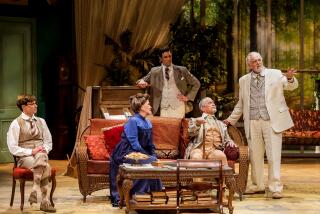‘Liar’ Ignites a Postal Passion
- Share via
It’s obvious from George Bernard Shaw’s writings that he was a passionate man. At least on paper. His long and loving marriage to the wealthy Charlotte Payne-Townshend was, by prenuptial agreement, never consummated. In addition, throughout his long life Shaw carried on a many-splendored series of flirtations with most of the famous actresses of his day, from Ellen Terry to Edith Evans.
It was all just words. He wrote to Eleanor Robson in 1904, “I have no interest in mere females; but I love all artists: They belong to me in the most sacred way.”
Usually his ardent pen was wooing the artist for his latest play. One of his longest literary affairs began in the 1890s, with Stella Campbell (known professionally as Mrs. Patrick Campbell). Shaw captured her most notably in 1914, to originate the role of Eliza Doolittle in “Pygmalion.” Like Eliza, their letters have lived on, and they form the basis of Jerome Kilty’s 1960 theater piece, “Dear Liar,” being revived by Shakespeare Orange County at Chapman University’s Waltmar Theatre.
Kilty’s sentimental adaptation of the Shaw-Campbell correspondence glosses over the fact that Shaw was concurrently plying his postal passion to other actresses, and Kilty, for the sake of dramatic form, ignores the many cutting and derogatory statements Shaw made about Campbell’s performances in print and in his letters. And he ignores the fact that Shaw was generally less than sincere; even Terry tossed back to Shaw, “Stupid! This ‘Ellen hunger’ stuff I’ve laughed at long enough.”
Shaw was never as sentimental as Kilty makes him out, and in his staging director Carl Reggiardo points up the often peppery tone of their relationship to make up for Kilty’s sometimes too-gentle Shaw. He provides fire in spots where the script doesn’t necessarily call for it, giving the evening a burnished tone with bright highlights and a rewarding depth in its shadowy moments. He also knows where the humor is, and the big laughs never fail to explode exactly in the right places.
The letters cover a long period, from the 1890s until just before Campbell’s death in 1940. It is a pristine correspondence, with Shaw creating on paper the figure of “G.B.S.” as he did in all his letters, sort of like the more-romantic-than-real personas people create today in Internet chat rooms. This pen and paper facade worked well for Shaw, and Reggiardo allows the viewer to watch Shaw alter his self-portrait through the years.
Part of the success of this production is the casting of an “acting couple” in the roles: John-Frederick Jones as Shaw and Laurel Kelsh Jones as Campbell. It brings a subtle hint of intimacy to the often kittenish exchanges, and an immediacy to the pingpong edginess both were fond of.
Jones’ Shaw is at its best when “the Genius” is at his most unforgiving, glancing with impatience at the actress whose value to him has passed its prime. He has at moments a sly look, as though this Shaw is secretly enjoying not the meaning of his words, but the effect they are having on Campbell. At these times the real Shaw shines through.
Shaw didn’t change much through the decades, but Campbell’s life and personality were prey to the vagaries of an actress’ existence. Kelsh Jones manages these transitions effortlessly. From the sparkling young actress of the 1890s to the aging, sometimes slightly bitter woman who could get only bit roles in the Hollywood of the 1930s, Kelsh Jones runs a gamut from bubbling anxiety to calm, and often sad, reflection. It’s a well-honed portrait of a complex woman.
(BEGIN TEXT OF INFOBOX / INFOGRAPHIC)
* “Dear Liar,” Waltmar Theatre, Chapman University, 333 N. Glassell St., Orange. Thursdays-Saturdays, 8 p.m.; Sundays, 3 p.m. Ends Sept. 5. $22-$24. (714) 744-7016. Running time: 2 hours, 10 minutes.
John-Frederick Jones: George Bernard Shaw
Laurel Kelsh Jones: Mrs. Patrick Campbell
A Shakespeare Orange County production of Jerome Kilty’s comedy-drama. Directed by Carl Reggiardo. Scenic/property/sound design: Craig Brown. Lighting: Ron Coffman. Stage manager: Michelle M. Boone.
More to Read
The biggest entertainment stories
Get our big stories about Hollywood, film, television, music, arts, culture and more right in your inbox as soon as they publish.
You may occasionally receive promotional content from the Los Angeles Times.









